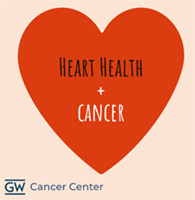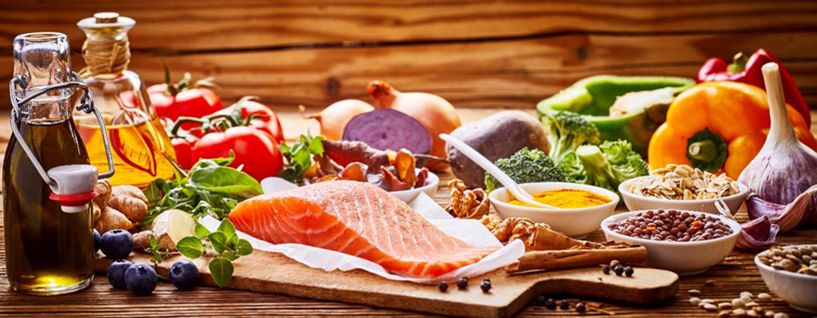
They’re everywhere you look, those Valentines. Today, when we celebrate all things love, it makes sense to take a look at the muscular organ beating deep within our chests and learn how nutrition goes hand in hand with heart health and cancer.

Lauren Powell, RDN, LDN, is GW Cancer Center’s clinical oncology dietician. She works closely with cancer care teams to develop nutrition interventions and strategies to support patients navigating their cancer journey. “First, it’s important to note that cancer treatments are initiated to help rid the body of cancerous cells,” she says. “Unfortunately, those treatments impact healthy cells, including the heart. Treatments that target the chest area have an even greater impact on the heart than treatments that target other areas of the body.”
She recommends discussing with your oncologist how your treatment may affect heart health and how nutrition can be optimized to keep your heart as healthy as possible. Good nutrition is vital to overall health and is even more important when cancer is part of the mix.
The Mediterranean Diet
Studies have shown that the heart-healthy Mediterranean Diet reduces hypertension (high blood pressure), cholesterol, and blood sugar. Furthermore, it promotes foods that help fight cancer. But how, you may ask, does it do this?
The Mediterranean eating style emphasizes plant-based foods – think fruits and vegetables, whole grains, legumes, and nuts and seeds. Limit red meats. Instead, opt for fish. Reach for olive oil instead of butter or margarine when cooking.
Plant-based diets are rich in fiber, phytonutrients, antioxidants, unsaturated fats, and omega-3 fatty acids. That seems like a mouthful, so let’s break it down:
-
Fiber
- Found in fruits, vegetables, nuts, and whole grains, fiber is a substance that can improve cholesterol levels, lower your blood sugar, and promote regular bowel movements.
- It also makes you feel fuller, so it can reduce the amount of food you take in.
-
Phytonutrients and antioxidants
- Phyto = plant. So, phytonutrients are nutrition derived from plants. They protect your cells from damage caused by environmental toxins and the body’s natural metabolic processes.
- Consider antioxidants your body’s superhero. (Minus the cape.) Antioxidants reduce inflammation, boost the immune system, and protect against environmental toxins. They protect the body from free radicals, unstable molecules that cause chemical reactions that can lead to cancer development and impaired cardiac function if they’re not neutralized by antioxidants.
-
Unsaturated fats
- These fats are liquid at room temperature, unlike their saturated fat counterparts, which stay solid. Known as the “good fats,” they can improve levels of high-density lipoprotein, or HDL, the “good” cholesterol.
- Unsaturated fats are essential for supporting cell growth, protecting your organs, and promoting nutrient absorption.
The DASH Diet
DASH is short for Dietary Approaches to Stop Hypertension. Like the Mediterranean Diet, it heavily focuses on plant-based foods, lean protein, and unsaturated fats but also emphasizes low sodium intake. That dash of salt you add to your dinner? Not so much with the DASH Diet.
You can implement the DASH Diet by:
-
Having two or more meat-free meals each week.
-
Make sure you have at least one serving of fruit or vegetables per meal.
-
Experiment with herbs and spices (instead of salt) to make food tastier.
-
Ditch the chips in favor of nuts or seeds. And make sure they’re unsalted!
-
Reach for whole grain products instead of white bread, pasta, and rice.
Pitfalls and Challenges
Keep your healthcare team in the know if you develop any new symptoms such as fatigue, shortness of breath, chest pain, or swelling of the hands or feet as these may be signs of heart troubles. Monitor blood pressure and cholesterol levels before, during, and after treatment. Your cancer care team can help by developing strategies to manage nausea, vomiting, constipation, diarrhea, and low appetite. All of these symptoms can impact the desire to eat. When food intake is decreased, so are the nutrients needed to stay healthy. Eating is key!
Make sure you stay hydrated. Adequate hydration is essential to manage blood volume, prevent hypernatremia (high sodium levels), and keep your heart pumping blood to your muscles. When blood is pumped effectively, it keeps your muscles working (including the muscles in your heart).
It’s All About the Teamwork
GW Cancer Center employs a multidisciplinary approach to cancer care. This approach involves oncologists and cancer dietitians managing cancer patients' overall health, including heart health. “Dietitians play a vital role in helping those who are about to start treatment, are undergoing treatment, or have completed it,” explains Lauren. “We have a monthly Nutrition Club for patients, caregivers, and providers where we discuss topics related to nutrition and cancer prevention, treatment, and survivorship. It’s a great resource.”
When it comes to matters of the heart, keeping it healthy (whether you have cancer or not) is really what matters.
Heart-Healthy Foods

If the whole idea of choosing heart-healthy foods seems overwhelming, don’t worry. We have a grocery list that will help you make the right choices – for you, your family, and your heart.
Seafood
- Salmon
- Mackerel
- Tuna
- Sea bass
- Mussels
- Sardines
- Shrimp
Fruits
- Apple
- Banana
- Orange
- Apricot
- Blueberry
- Grapefruit
- Plum
- Pear
- Strawberry
- Pomegranate
- Tangerine
- Tomato *
- Grapes
- Date
- Fig
- Melon
- Peach
- Cherry
- Avocado *
Vegetables
- Tomato *
- Broccoli
- Kale
- Spinach
- Onion
- Cauliflower
- Cabbage
- Carrot
- Brussels sprouts
- Avocado *
- Cucumber
Legumes
- Chickpea/ garbanzo
- Black, red, green, and yellow lentils
- Black, white, pinto bean
- Kidney beans
- Black-eyed peas
Nuts/Seeds
- Walnuts
- Almond
- Macadamia
- Cashew
- Hazelnut
- Chia
- Flax
- Hemp
- Amaranth
- Pine nuts
- Pumpkin
- Sunflower
- Poppy
- Sesame
Grains
- Barley
- Bulgar
- Couscous
- Oatmeal
- Whole wheat pasta
- Polenta
- Quinoa
- Brown rice
- Whole grain breads
*Falls under the category Fruit and Vegetable.



